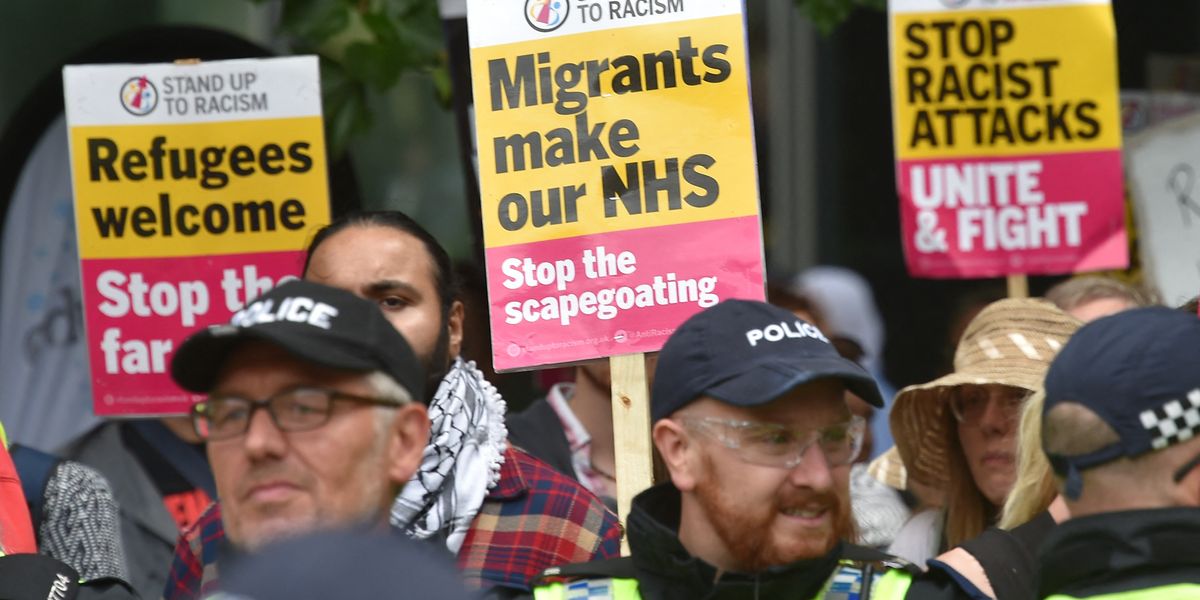SIX days of violent rage last summer finally ended after a call for a racist pogrom where nobody came. That week showed how much small groups of people could shift national narratives.
The violence which flashed across thirty locations saw fewer than 5,000 rioters nationwide. Hundreds came out for clean-up campaigns, sending a different message about what their towns stood for.
The online list hoping to incite violence targeting forty migration centres and law firms was a violent fantasy – yet the fear and panic it generated were real. Around 15,000 people went out to show practical solidarity. But millions more were glad that they did. For one day, the front-pages of the right-wing Daily Mail – “The Night Anti-Hate Marchers Faced Down the Thugs” – and the left-wing Daily Mirror were hard to tell apart.
That brief outbreak of unity feels like a distant memory now. Asylum dominates politics again. The police must contain those seeking to intimidate asylum seekers by facilitating only lawful protests. The anniversary of the counter-protests is marked too by a “Welcome Weekend” to ensure those who support refugees can make their voices heard too.
British Asian views of asylum are not so different from those of the white British. The balance of pretty sympathetic, more sceptical and downright xenophobic views shifts dramatically by age, education and political perspective among Asians as it does among the broader public too. Those who see their own families reflecting the positive contribution of migration to British society can find that a distinction between legal and illegal immigration resonates. Black British views tend to be more sympathetic to asylum seekers. Sharper scepticism about the Home Office was reinforced again by the Windrush scandal.
A wide range of views about immigration numbers, its pressures and gains, and how to make integration work can be found across minority and majority groups. One useful litmus test of a legitimate argument about immigration is whether it can appeal across white, black and Asian Britons – or only speaks to one group.
Politicians constantly emphasise that they recognise ‘legitimate concerns’ about immigration – but a crucial half of the argument has gone missing this summer. Any meaningful description of which arguments and debates are legitimate in a democracy depends on rejecting arguments rooted in violence, xenophobia and racial prejudice. But how often, when a politician talks about recognising legitimate concerns in 2025, is anything said about what needs to be excluded as illegitimate too?
This anniversary of the counter-protests should be a chance to rebalance the argument. It is time to ensure that the legitimate concerns of ethnic minorities in Britain – about a concerted effort to dissolve foundational social norms against racism, and to deny our status as equal citizens – are heard too There is an attempt to mainstream the idea of ‘remigration’ – a far right code for kicking out all of the migrants and ethnic minorities too. The last three years have seen the de facto legalisation of racial abuse in online space. Elon Musk has turned Twitter/X into one of the most powerful amplifiers of racism we have ever seen. Government departments are reluctant to even review whether they should still use, as a key channel of public communication, a site which ethnic minorities can barely use without facing everyday racism from antisemites, racists and open Nazis.
New TV channels appear unwilling to draw a line between political debate and sweeping prejudice too. GB News platformed a guest essay to argue that anti-Muslim prejudice is rational not irrational – and since Islam does not “belong here”, anybody wishing to uphold that faith should leave Britain for a “Muslim country”.
Rupert Lowe is campaigning for negative net migration. He confirmed that he now wants to deport “a large share of legal and settled migrants” so net migration is negative. Yet Opposition Leader Kemi Badenoch seems to lack the authority to prevent Tory MPs joining Lowe’s Restore Britain campaign for mass deportations.
Former soldier and TV celebrity Ant Middleton, who was part of Nigel Farage’s Reform delegation to Trump’s inauguration, now proposes banning people from public office until their ancestors have been here for four generations. He would not just make Sadiq Khan and Kemi Badenoch ineligible for office – but even their children too.
These absurd racist fantasies of disenfranchising or deporting Rishi Sunak, Kemi Badenoch and Sadiq Khan will fail but they toxify the experience of public life. British-born minorities do have some birthright, nativist privilege when racist troglodytes reveal their maximalist remigration agenda. It is a bigger challenge to protect asylum seekers from dehumanising rhetoric and action. Our leaders should be able to address the legitimate concerns of minority and majority groups at once. Only those seeking to pander to illegitimate xenophobic views too should fear that it is a zero-sum game. If politicians want to be trusted, they need to address the legitimate concerns of ethnic minorities about keeping racism out of British public life.
Sunder Katwala is the director of thinktank British Future and the author of the book How to Be a Patriot: The must-read book on British national identity and immigration.

